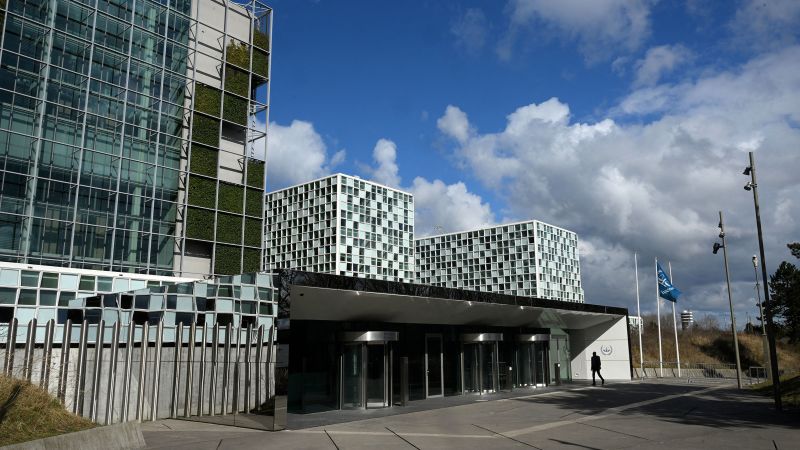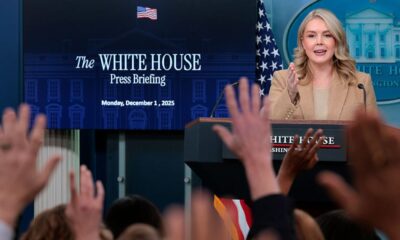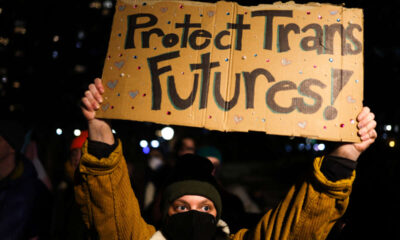Science
Trump Administration Imposes Sanctions on ICC Officials

The Trump administration has intensified its opposition to the International Criminal Court (ICC) by imposing sanctions on four additional officials associated with investigations into alleged war crimes committed by the United States and Israel. On Wednesday, Secretary of State Marco Rubio announced that the State Department is designating Kimberly Prost, Nicolas Guillou, Nazhat Shameem Khan, and Mame Mandiaye Niang for their roles in the ICC’s actions against nationals of both countries.
The sanctions follow an executive order signed by former President Donald Trump in February 2020, which permits punitive measures against ICC personnel due to what the administration claims are “illegitimate and baseless actions” targeting the United States and its ally Israel. This order has previously been utilized to sanction ICC chief prosecutor Karim Khan and four judges.
According to a fact sheet from the State Department, Judge Kimberly Prost is being sanctioned for her decision to allow an investigation into U.S. personnel in Afghanistan. Judge Nicolas Guillou faces sanctions for his role in authorizing arrest warrants against Israeli Prime Minister Benjamin Netanyahu and former Minister of Defense Yoav Gallant. The Deputy Prosecutors, Nazhat Shameem Khan and Mame Mandiaye Niang, are being punished for their continued support of the ICC’s operations against Israel, including their endorsement of the arrest warrants targeting Netanyahu and Gallant.
The ICC issued these arrest warrants in November 2024, alleging that both Netanyahu and Gallant committed war crimes and crimes against humanity. The escalation of sanctions reflects the ongoing tensions between the Trump administration and the ICC, particularly since the court authorized an investigation into alleged war crimes committed by U.S. and Afghan forces, as well as actions by the Taliban.
The sanctions represent a broader strategy by the Trump administration to challenge the ICC’s authority following its decision to investigate U.S. actions, which many officials perceive as an infringement on national sovereignty. The administration’s actions have drawn criticism from various human rights organizations and legal experts, who argue that such measures undermine international law and accountability.
As the situation develops, the implications of these sanctions on international legal frameworks and U.S. diplomatic relations remain to be seen. The ICC continues to assert its independence and commitment to pursuing justice, despite the challenges posed by political pressures from member states.
-

 Technology5 months ago
Technology5 months agoDiscover the Top 10 Calorie Counting Apps of 2025
-

 Health2 months ago
Health2 months agoBella Hadid Shares Health Update After Treatment for Lyme Disease
-

 Health3 months ago
Health3 months agoErin Bates Shares Recovery Update Following Sepsis Complications
-

 Technology4 months ago
Technology4 months agoDiscover How to Reverse Image Search Using ChatGPT Effortlessly
-

 Technology1 month ago
Technology1 month agoDiscover 2025’s Top GPUs for Exceptional 4K Gaming Performance
-

 Technology2 months ago
Technology2 months agoElectric Moto Influencer Surronster Arrested in Tijuana
-

 Technology5 months ago
Technology5 months agoMeta Initiates $60B AI Data Center Expansion, Starting in Ohio
-

 Technology5 months ago
Technology5 months agoRecovering a Suspended TikTok Account: A Step-by-Step Guide
-

 Health4 months ago
Health4 months agoTested: Rab Firewall Mountain Jacket Survives Harsh Conditions
-

 Lifestyle5 months ago
Lifestyle5 months agoBelton Family Reunites After Daughter Survives Hill Country Floods
-

 Technology4 months ago
Technology4 months agoHarmonic Launches AI Chatbot App to Transform Mathematical Reasoning
-

 Technology3 months ago
Technology3 months agoUncovering the Top Five Most Challenging Motorcycles to Ride





















